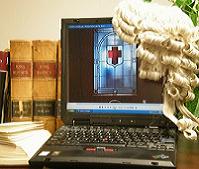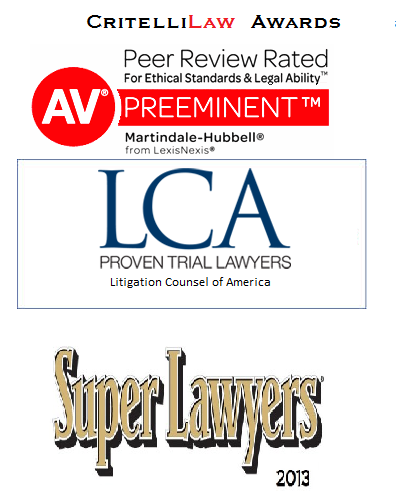How to be a Successful Lawyer
Sep 17th, 2010 | By critellilaw | Category: Professional Education“During my term on the Iowa Supreme Court’s Attorney Disciplinary Board, both as a member and as the chair, I have had the opportunity to read thousands of complaints against Iowa lawyers. In my opinion, many of them could have been avoided, or sanctions perhaps not imposed, if the attorneys had understood what their responsibilities had been and had fulfilled them. If someone had taken the time to tell them how to be a ‘successful’ lawyer, rather than just a winning lawyer or one with a large income.
If someone had taken the time to tell them what I am about to tell you today.”
I’d like to ask you all a question, hopefully one you have all asked yourself at one time or another. Perhaps one you ask yourself quite frequently these days. The question is this:
Why are you a lawyer?
Why are YOU a lawyer?
The public’s disdain for the legal profession is, of course, nothing new. Most of us can quote the line from Shakespeare’s Henry VI, when, during a discussion about the utopia that will occur when the pretender to the throne, Jack Cade, takes power, the character called Dick the Butcher remarked that “The first thing we do, let’s kill all the lawyers.”
It got a laugh then, it usually still gets one now.
Others of you may be aware of Hitler’s comment that “[he] shall not rest until every German sees that it is a shameful thing to be a lawyer.” It got a cheer then and, if you substitute “American” for “German,” no doubt would get some today.
Yet despite these sentiments, and the countless lawyer-jokes we have all heard, perhaps chuckled at and, yes, sometimes even told, we all made the decision to spend a lot of time, money and hard work at becoming lawyers. At becoming the punchline, the despised and, sometimes, the hated.
Why are YOU a LAWYER? I can ask you the question, but I can’t answer it for you. Only you can do that, and it’s an exercise I would encourage each of you to undertake sometime this weekend. What I can tell you, however, is how to be a SUCCESSFUL lawyer.
Not “successful” in the sense that you will win every case, or any cases for that matter. Not “successful” in the sense that you will make a lot of money, or win awards or collect accolades. But rather “successful” in the sense that you are meeting the responsibilities required of you as a member of our legal profession.
During my term on the Iowa Supreme Court’s Attorney Disciplinary Board, both as a member and as the Chair, I have had the opportunity to read thousands of complaints against Iowa lawyers. In my opinion, many of them could have been avoided or sanctions perhaps not imposed, if the attorneys had understood what their responsibilities had been and had fulfilled them. If someone had taken the time to tell them how to be a “successful” lawyer, rather than just a winning lawyer or one with a large income.
If someone had taken the time to tell them what I am about to tell you today.
A lawyer, as a member of the legal profession, is a representative of clients, an officer of the legal system, and a public citizen having special responsibility for the quality of justice.
As a representative of clients, a lawyer performs various functions. As advisor, a lawyer provides a client with an informed understanding of the client’s legal rights and obligations and explains their practical implications. As advocate, a lawyer zealously asserts the client’s position under the rules of the adversary system. As negotiator, a lawyer seeks a result advantageous to the client but consistent with requirements of honest dealings with others. As an evaluator, a lawyer acts by examining a client’s legal affairs and reporting about them to the client or to others.
In all professional functions a lawyer should be competent, prompt, and diligent. A lawyer should maintain communication with a client concerning the representation. A lawyer should keep in confidence information relating to representation of a client except so far as disclosure is required or permitted by the Iowa Rules of Professional Conduct or other law.
A lawyer’s conduct should conform to the requirements of the law, both in professional service to clients and in the lawyer’s business and personal affairs.
A lawyer should use the law’s procedures only for legitimate purposes and not to harass or intimidate others.
A lawyer should demonstrate respect for the legal system and for those who serve it, including judges, other lawyers, and public officials. While it is a lawyer’s duty, when necessary, to challenge the rectitude of official action, it is also a lawyer’s duty to uphold legal process.
As a public citizen, a lawyer should seek improvement of the law, access to the legal system, the administration of justice, and the quality of service rendered by the legal profession.
As a member of a learned profession, a lawyer should cultivate knowledge of the law beyond its use for clients, employ that knowledge in reform of the law, and work to strengthen legal education. In addition, a lawyer should further the public’s understanding of and confidence in the rule of law and the justice system because legal institutions in a constitutional democracy depend on popular participation and support to maintain their authority.
A lawyer should be mindful of deficiencies in the administration of justice and of the fact that the poor, and sometimes persons who are not poor, cannot afford adequate legal assistance. Therefore, all lawyers should devote professional time and resources and use civic influence to ensure equal access to our system of justice for all those who because of economic or social barriers cannot afford or secure adequate legal counsel.
A lawyer should aid the legal profession in pursuing these objectives and should help the bar regulate itself in the public interest. Many of a lawyer’s professional responsibilities are prescribed in the Iowa Rules of Professional Conduct, as well as substantive and procedural law. However, a lawyer is also guided by personal conscience and the approbation of professional peers.
A lawyer should strive to attain the highest level of skill, to improve the law and the legal profession, and to exemplify the legal profession’s ideals of public service.
A lawyer’s responsibilities as a representative of clients, an officer of the legal system, and a public citizen are usually harmonious. Thus, when an opposing party is well represented, a lawyer can be a zealous advocate on behalf of a client and at the same time assume that justice is being done.
So also, a lawyer can be sure that preserving client confidences ordinarily serves the public interest because people are more likely to seek legal advice, and thereby heed their legal obligations, when they know their communications will be private.
In the nature of law practice, however, conflicting responsibilities are encountered. Virtually all difficult ethical problems arise from conflict between a lawyer’s responsibilities to clients, to the legal system, and to the lawyer’s own interest in remaining an ethical person while earning a satisfactory living.
The Iowa Rules of Professional Conduct often prescribe terms for resolving such conflicts. Within the framework of these rules, however, many difficult issues of professional discretion can arise. Such issues must be resolved through the exercise of sensitive professional and moral judgment guided by the basic principles underlying the rules. These principles include the lawyer’s obligation zealously to protect and pursue a client’s legitimate interests, within the bounds of the law, while maintaining a professional, courteous, and civil attitude toward all persons involved in the legal system.
As you know, the legal profession is largely self-governing. Although other professions also have been granted powers of self-government, the legal profession is unique in this respect because of the close relationship between the profession and the processes of government and law enforcement. This connection is manifested in the fact that ultimate authority over the legal profession is vested largely in the courts. To the extent that lawyers meet the obligations of their professional calling, the occasion for government regulation is obviated.
Self-regulation also helps maintain the legal profession’s independence from government domination. An independent legal profession is an important force in preserving government under law, for abuse of legal authority is more readily challenged by a profession whose members are not dependent on government for the right to practice.
The legal profession’s relative autonomy, however, carries with it special responsibilities of self-government. The profession has a responsibility to ensure that its regulations are conceived in the public interest and not in furtherance of parochial or self-interested concerns of the bar.
Every lawyer is responsible for observance of the Iowa Rules of Professional Conduct. A lawyer should also aid in securing their observance by other lawyers. Neglect of these responsibilities compromises the independence of the profession and the public interest which it serves.
Lawyers play a vital role in the preservation of society. The fulfillment of this role requires an understanding by lawyers of their relationship to our legal system. The Iowa Rules of Professional Conduct, when properly applied, serve to define that relationship.
I wish I could say that I was wise enough to have written those words, but I am not. What I read to you was the simply the preamble to the Iowa Rules of Professional Conduct, the beginning of the rules that define our relationship as lawyers to our clients, to the legal system, and to society. I would suggest, ask, demand, urge and, if possible, compel you to read through the Rules once per year, preferably while eating ice cream, chocolate or some other special food. Make it a celebration. A celebration of being a lawyer.
As I stated at the beginning of this presentation, we all made the decision to spend a lot of time, money and hard work at becoming lawyers. We finished our undergraduate studies, then took the LSAT. We applied, were accepted and undertook our legal studies. Ultimately we received our Doctorate in Jurisprudence. Then we sat the bar exam and waited. Remember what it was like, waiting for the bar results to come back? For some of us it was an agonizing couple of days until they were posted. For others, it may have been weeks or even months before the results came back stating that we had passed. We were one step away from becoming members of the bar.
I’d like to end on that final step. The thing that sets us apart from everyone else who received their undergraduate degree, took the LSAT, obtained their Doctorate of Jurisprudence and passed the bar exam. Unlike those folks, we did something else: we took an oath.
I don’t know about you, but when I was being sworn in by the Chief Justice of Iowa, as I was repeating those words of the oath, my throat was dry and my heart pounding in my chest. Perhaps it was just me, however, as I remember having the same reaction when taking the oath to marry my wife….
I thought it would be worth concluding with the words of the oath all of us took– let me rephrase that, all of us swore to undertake. Those of you that were recently admitted may recall the words. Most of you probably don’t. I certainly don’t remember them from that day of my admission during a blizzard in February of 1996. Funny how I remember the snow, but not the words I swore to uphold. [Note: Subsequent to the speech I learned that the Oath now taken is different than the one that follows.]
I will support the Constitution of the United States and the Constitution of the State of Iowa;
I will maintain the respect due to Courts of Justice and Judicial officers;
I will counsel or maintain no other actions, proceedings, or defenses than those which appear to me to be legal and just, except the defense of a person charged with a public offense;
I will employ, for the purpose of maintaining causes confided to me, such means only as are consistent with truth, and will never seek to mislead the judges by any artifice or false statement of fact or law;
I will maintain inviolate the confidence, and, at any peril to myself, will preserve the secret of my client;
I will abstain from all offensive personalities and advance no fact prejudicial to the honor or reputation of a party or witness, unless required by the justice of the cause with which I am charged;
I will refuse to encourage either the commencement or continuance of an action or proceeding from any motive of passion or interest;
I will never reject from any consideration personal to myself, the cause of the defenseless or oppressed;
and I will faithfully discharge the duties of an attorney and counselor at law to the best of my ability and in accordance with the ethics of the profession, So Help Me God.
By remembering and upholding the words of the oath we swore, we may not win all of our cases. We may not have as large of incomes as we may desire, nor as many awards nor accolades. But we will become successful lawyers.












